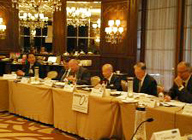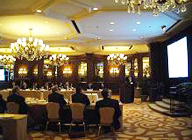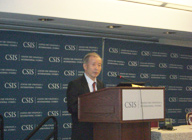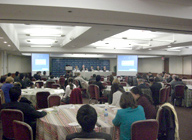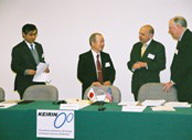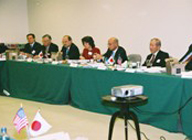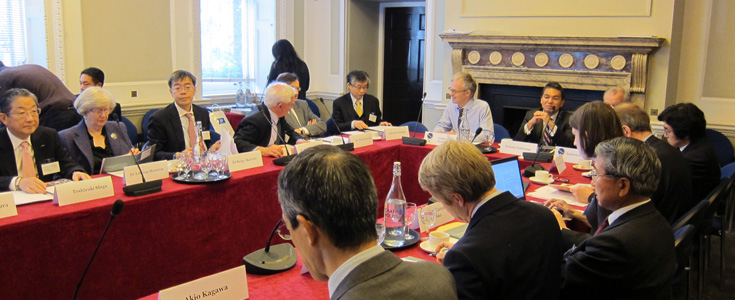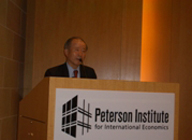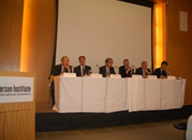| Date |
Monday, October 25, 2010
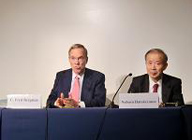 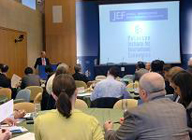 |
| Venue |
Washington DC, USA
C Fred Bergsten Conference Center
1750 Massachusetts Avenue, NW
Washington, DC 20036 |
| Sponsors |
Japan Economic Foundation
Peterson Institute for International Economics (PIIE) |
Topics"A Trans Pacific Partnership and the Future of the Asia Pacific Region"
Welcome and IntroductionC. Fred Bergsten, Peterson Institute for International Economics
Noboru Hatakeyama, Japan Economic Foundation (JEF)
Session I: The Economic and Strategic ContextKurt Campbell, Assistant Secretary of State for East Asian and Pacific Affairs
Akira Kojima, Senior Research Fellow, Japan Center for Economic Research (JCER)
Daniel Price, Senior Partner, Sidley Austin LLP
Session II: Shaping the Trans Pacific Partnership: Substance and MembershipMasakazu Toyoda, Chairman and CEO of the Institute of Energy Economies, Japan
Presentation
Barbara Weisel, Assistant U.S. Trade Representative for Southeast Asia and the Pacific
Mark Sinclair, Lead Negotiator, Trans-Pacific Partnership, Ministry of Foreign Affairs and Trade (MFAT), New Zealand
Presentation
Lunch and Session III: How Congress Views the TPP Congressman Kevin Brady (R-TX) [Via Video Conference]
Session IV: The Trans Pacific Partnership and Prospects for an FTAAPYoshihiro Watanabe, Advisor, Bank of Tokyo-Mitsubishi UFJ, Ltd; APEC Business Advisory Council Member of Japan
Presentation
Jeffrey J. Schott, Senior Fellow, Peterson Institute for International Economics
Presentation
Discussants: Peter A. Petri, Carl J. Shapiro Professor of International Finance, Brandeis University and Senior Fellow, East-West Center
Presentation
Session V: Conclusions and RecommendationsNoboru Hatakeyama, Japan Economic Foundation
C. Fred Bergsten, Peterson Institute for International Economics
(Audio link to PIIE)
Program
Participants
SummarySummary (English)Summary (Japanese)
Chairman's SpeechOpening Remarks by Mr. Noboru Hatakeyama (October 25, 2010 @JEF-PIIE Conference in Washington, D.C.)
Dr. Fred Bergsten, Director of the Peterson Institute for International Economies, the honorable Kurt Campbell, Assistant Secretary of State for East Asia and Pacific Affairs, distinguished guests, ladies, and gentlemen:
It is my great honor and privilege to welcome all of you to this International Symposium co-hosted by the PIIE and the Japan Economic Foundation.
First of all, I would like to express my heartfelt gratitude to Dr. Bergsten and his colleagues in the PIIE for co-hosting this conference with the JEF. I am also deeply grateful to all the distinguished speakers and panelists from the United States, New Zealand and Japan and to all of you who have joined us today despite your hectic schedules.
The subject of today's conference is "A Trans-Pacific Partnership and the Future of the Asia Pacific Region." In this region there are five FTA proposals:
The East Asian FTA [EAFTA], consisting of the ten ASEAN countries plus China, Japan, and South Korea [the so-called ASEAN +3];
The Comprehensive Economic Partnership of East Asia, [CEPEA], consisting of ASEAN +3 as well as Australia, India, and New Zealand [this group is known as ASEAN +6];
An FTA between China, Japan, and South Korea [CJK];
An FTA of Asia Pacific [FTAAP], consisting of APEC member economies and;
The TPP, consisting of the original Pacific four, that is to say Brunei, Chile, New Zealand, and Singapore, plus the six countries that have joined negotiations subsequently, namely Australia, Canada, Malaysia, Peru, the United States, and Vietnam.
Of these five proposals, Japan is a member of joint studies for the EAFTA and the CEPEA. Both of these have entered the governmental discussion stage prior to negotiations on rules of origin, customs procedures, tariffs, and economic cooperation.
In October, 2009, a consensus was reached to aim at launching a joint study on a China-Japan-Korea FTA at a second meeting between leaders of the three countries involved. The first and second meetings for a joint study on a CJK FTA, involving experts from industry, academia, and government, have already been in Seoul and Tokyo respectively. A third meeting, in China, will take place in December.
Last July, the government of Japan decided to come up with a road map to establish a FTAAP by 2020, taking advantage of Japan's hosting the APEC Leaders' Meeting to be held in Yokohama.
In addition, on October 1st this year, Prime Minister Naoto Kan made his first general policy speech in the Diet after the cabinet reshuffle in September. In this speech, he stated as follows, "We will look into participating in such negotiations as those for the TPP agreement and will aim to build a FTAAP."
However the qualifications for entering TPP are very severe. As you know, FTA in general should liberalize substantially all trade. In other words, the WTO admits that non-substantial trade may be exempted from the obligation to liberalize. However, in the case of P4, the prototype of the TPP, there are no such exemptions. If every country trying to join the TPP is asked to forgo its exemptions as a precondition for membership, this will function as a barrier to expanding a FTA and thereby reduce opportunities to implement free trade. It would be ironic indeed if barriers for joining an FTA became barriers for implementing free trade.
Personally, I think there are two reasons for Japan to join the TPP.
Firstly, this would offer a rare opportunity for the US and Japan to enter an FTA relationship. If this opportunity is missed, Japan may be forced to enter into a regional FTA relationship with China, at least, sooner than the US. Far better to enter an FTA relationship with the United States first-a country that shares the same values and is firmly tied to Japan through a security treaty.
Secondly, with all due respect to the current and potential future TPP members other than the US, from the American perspective the total combined size of their nine economies is too small to justify American participation in tough membership negotiations. In 2009, the total value of their GDP was $3.2 trillion-just 63% of Japan's GDP and 5.5% of world GDP. If Japan enters, the TPP's total share would be 39% of total world GDP, including the US.
For these reasons, when you decide whether to admit Japan to the TPP, I think it is crucial to take into account not just the current trade policy of the P4, having no exceptional items, but also strategic considerations, including the security of this region.
On this note, I would now like to declare the symposium formally open.
Thank you very much.
2017. JULY
2016. JUNE
2015. SEPTEMBER
2014. DECEMBER
2013. OCTOBER
2013. FEBRUARY
2011. NOVEMBER
2010. OCTOBER
2010. JANUARY
2008. DECEMBER
2007. NOVEMBER
2006. OCTOBER
2006. JULY
2005. SEPTEMBER
2004. MAY
2003. OCTOBER
